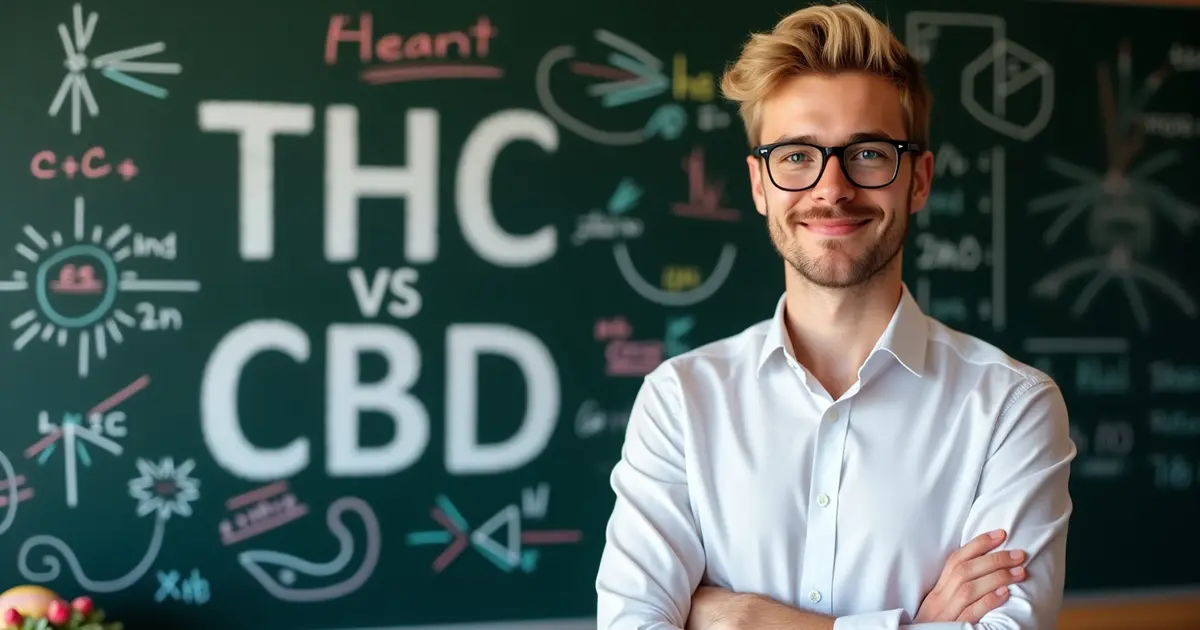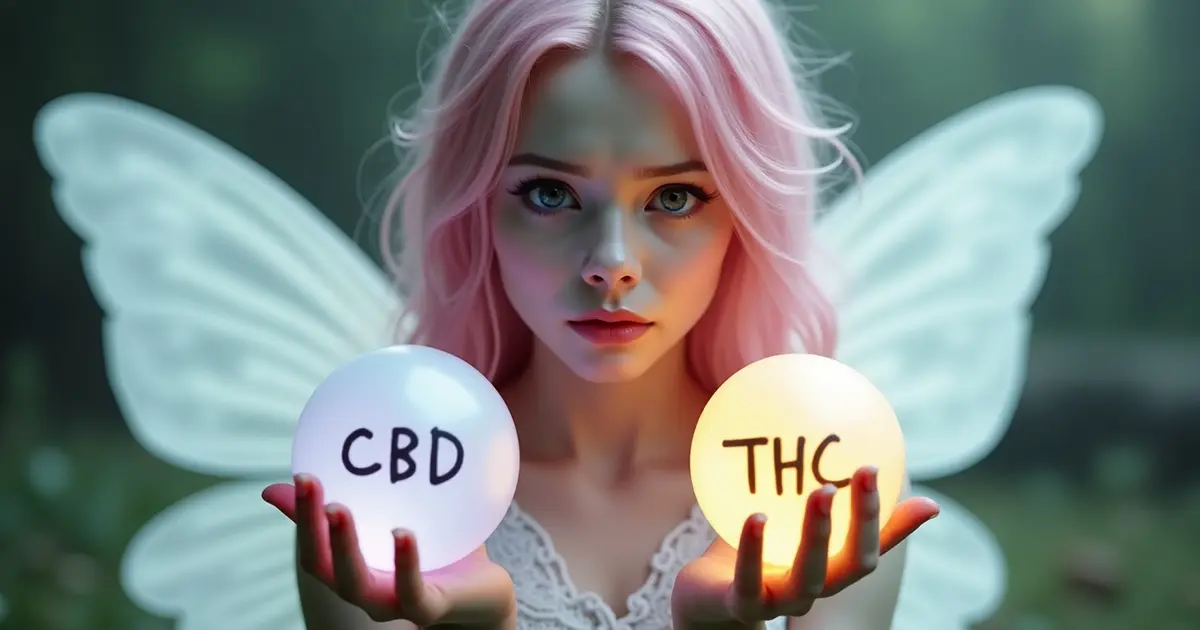Blog
THC vs. CBD: Understanding the Differences

When you’re shopping for cannabis products or researching medicinal options, you’ll quickly run into the debate: THC vs CBD. Both come from the cannabis plant, but they act differently in the body, produce different effects, and serve distinct purposes. This guide explains what is THC, what is CBD, THC meaning, THC effects, what does CBD do, and what does THC do — in plain English — so you can make smart choices and feel confident buying from Get Bud Online.
Quick Takeaway: CBD vs THC — The Short Answer
THC (tetrahydrocannabinol) is the compound most associated with the psychoactive “high” from cannabis. CBD (cannabidiol) is non-intoxicating for most people and is prized for calming, anti-inflammatory, and therapeutic effects. Which one you choose depends on whether you want mind-altering effects, symptom relief without intoxication, or a specific medical outcome.
What Is THC? (What Is THC And THC Meaning)
What is THC? THC stands for tetrahydrocannabinol, the primary psychoactive compound in cannabis. When people ask about THC meaning, they’re asking about the molecule responsible for the intoxicating effects commonly associated with marijuana.
- THC meaning (simple): The chemical in cannabis that binds to CB1 receptors in the brain and nervous system and causes the “high.”
- How it works: THC activates the body’s endocannabinoid system, particularly CB1 receptors found in the brain, which influences mood, memory, appetite, and perception.
- Common forms: Marijuana flower, cannabis concentrates, weed edibles, THC vape cartridges, tinctures, and more.
What Is CBD? (What Is CBD And What Does CBD Do)
What is CBD? CBD stands for cannabidiol, another major cannabinoid in cannabis and hemp plants. Unlike THC, CBD is generally non-intoxicating — meaning it usually doesn’t make you feel “high.”
What does CBD do? CBD interacts with many systems in the body (including the endocannabinoid system) but doesn’t bind strongly to CB1 receptors. Instead, it modulates signaling, inflammation, and stress responses. People commonly use CBD for:
- Anxiety and stress relief
- Sleep support
- Pain and inflammation management
- Seizure reduction in specific conditions
- Skin conditions and skincare formulations
CBD products appear as oils, capsules, topicals, gummies, vapes, and full-spectrum or isolate extracts.

THC vs CBD: Key Differences (CBD vs THC)
When comparing cbd vs thc, consider these core differences:
- Psychoactivity: THC = psychoactive; CBD = usually non-psychoactive.
- Legal status: CBD from hemp (≤0.3% THC federally in the U.S.) is legal at the federal level, while THC legality varies by state. (Check local laws before buying.)
- Medical uses: Both have medical benefits but often for different conditions — THC for appetite stimulation, nausea, and neuropathic pain; CBD for anxiety and seizure disorders.
- Side effects: THC can cause paranoia, increased heart rate, and cognitive impairment at high doses; CBD’s side effects are generally mild (fatigue, dry mouth) and often dose-dependent.
- Drug testing: THC will trigger most standard drug tests; CBD-only products can sometimes contain trace THC and still register positive.
How THC And CBD Work In The Body
The body has an endocannabinoid system (ECS) — a network of receptors, enzymes, and internal cannabinoids that regulate sleep, pain, mood, appetite, immune response, and more.
- THC effects: THC binds primarily to CB1 receptors in the brain, producing psychoactive effects like euphoria, altered perception, and relaxation. This binding is behind most what does THC do questions.
- CBD effects: CBD influences the ECS indirectly — it can inhibit enzymes that break down natural endocannabinoids, act on serotonin receptors, and modulate inflammation. That’s why many ask what does CBD do when seeking symptom relief without intoxication.
THC Effects: What Does THC Do?
When someone asks about THC effects, they typically want to know both the immediate sensations and therapeutic actions.
Immediate/Acute Effects
- Euphoria or feeling “high”
- Altered sensory perception and time perception
- Relaxation or sedation (dose-dependent)
- Increased appetite (“the munchies”)
- Dry mouth and red eyes
Potential Therapeutic Effects
- Pain relief (especially neuropathic pain)
- Anti-nausea and appetite stimulation (useful in chemotherapy)
- Muscle relaxation and spasm control
- Sleep enhancement for some users
Risks & Downsides
- Anxiety or paranoia at high doses
- Impaired short-term memory and coordination
- Increased heart rate; caution for people with heart conditions
- Potentially increased risk of dependence with heavy long-term use for some individuals
What Does CBD Do? Benefits And Uses
What does CBD do across different use cases? CBD is commonly used for:
- Anxiety relief: Many users find CBD reduces anxious feelings without impairment.
- Pain and inflammation: CBD can help reduce inflammatory signals and is used in chronic pain management.
- Sleep support: For people with anxiety-driven insomnia, CBD can help improve sleep quality.
- Neurological support: CBD has FDA-approved use for certain seizure disorders (e.g., Epidiolex for rare pediatric epilepsies).
- Topical benefits: CBD-infused creams may help localized pain and inflammation, though research is ongoing.
Safety & Side Effects
- Mild side effects: fatigue, dry mouth, changes in appetite
- Drug interactions: CBD can affect liver enzymes (CYP450), so check with a healthcare provider if you take prescription meds.

Medical Uses: When To Choose THC, CBD, Or Both
Choosing between THC and CBD depends on the condition and the desired balance between effectiveness and psychoactivity.
- Choose THC for conditions where psychoactive effects or appetite stimulation are acceptable or helpful (e.g., chemotherapy-related nausea, certain chronic pain cases).
- Choose CBD when you want symptom relief without intoxication (e.g., anxiety, mild pain, inflammation).
- Choose a combination (full-spectrum) if you want the “entourage effect” — the theory that cannabinoids and terpenes work better together. Many medical patients report better symptom control with balanced THC/CBD formulations.
Forms And Methods Of Use
How you take THC or CBD affects onset time and intensity:
- Inhalation (vaping, smoking): Fast onset (minutes), shorter duration. Good for quick relief.
- Edibles: Slower onset (30–120 minutes), longer duration (4–8+ hours). Dose carefully; start low and wait.
- Tinctures & Sublinguals: Medium onset (15–45 minutes), controlled dosing.
- Topicals: Localized relief without systemic effects — ideal for sore muscles or skin conditions.
- Capsules: Predictable dosing, slower onset.
Tip: If you’re new, start with a low dose (microdosing) and increase slowly to find the minimum effective dose.
Safety, Side Effects, And Drug Interactions
Both THC and CBD have safety profiles to respect:
- THC safety: Don’t drive or operate machinery while high. Avoid mixing with alcohol. Pregnant or breastfeeding people should avoid THC.
- CBD safety: Check for drug interactions and consult a healthcare provider if you’re on medications. Though generally well tolerated, CBD can cause fatigue or digestive upset in some users.
- Quality matters: Buy from reputable retailers (like Get Bud Online), ask for lab certificates (COAs), and choose third-party tested products to avoid contaminants and ensure accurate cannabinoid levels.
Legal Considerations (U.S.)
- Hemp-derived CBD with ≤0.3% THC is federally legal in the U.S., but state laws vary.
- Marijuana (higher-THC cannabis) legality depends on state law — many states allow recreational and/or medical use; others restrict it.
- If you live near state borders, confirm local regulations before purchasing or transporting cannabis products.
How To Choose: Practical Tips For Shoppers
- Identify your goal: Sleep, pain relief, anxiety management, recreation? That guides THC vs CBD choices.
- Check product labels: Look for milligrams of THC and CBD per serving and total package.
- Ask for COAs: Certificate of Analysis shows potency and contaminant testing.
- Start low, go slow: Especially with edibles — begin with a small dose and wait.
- Consider ratios: 1:1 THC:CBD offers balanced effects; high-CBD/low-THC minimizes intoxication.
- Read reviews and brand policies: Trustworthy vendors provide transparent information and customer support.
Frequently Asked Questions
Q: What is THC vs CBD?
A: THC is the psychoactive cannabinoid that causes a high; CBD is generally non-intoxicating and used for calming, anti-inflammatory, and supportive effects.
Q: What does THC do?
A: THC binds to CB1 receptors in the brain to produce euphoria, altered perception, and relief from certain symptoms like pain and nausea.
Q: What does CBD do?
A: CBD modulates the endocannabinoid system and other receptors to reduce anxiety, inflammation, and seizures, among other benefits — typically without causing a high.
Q: Will CBD get me high?
A: Most pure CBD products will not intoxicate you. However, full-spectrum CBD may contain trace THC (up to legal limits), which could affect sensitive individuals.
Q: Which is better — CBD vs THC?
A: There’s no universal “better.” It depends on your goals. CBD is better for non-intoxicating relief; THC may be more effective for appetite stimulation, nausea, and some types of pain.
Choosing Products On Get Bud Online
At Get Bud Online we offer a curated selection of lab-tested CBD and THC products for every need:
- Not sure where to start? Explore our beginner-friendly low-dose tinctures and balanced 1:1 formulas.
- Looking for medical-grade options? Try our measured-dose capsules and full-spectrum extracts.
- Prefer non-intoxicating support? Browse our broad selection of CBD isolates and broad-spectrum blends with lab reports available.
Shop confidently — all products on Get Bud Online include third-party COAs and clear dosing information so you know exactly what does CBD do or what does THC do in each item.
Final Thoughts: Make An Informed Choice
Understanding THC vs CBD helps you choose the right product for your goals. THC offers powerful therapeutic benefits — and a high — while CBD provides many of the same wellness benefits without intoxication for most people. Both can be valuable, and combined products can sometimes provide the best results.
If you’re unsure, start with lower doses, consult with a healthcare provider (especially if you take other medications), and choose products with transparent lab testing.
Ready to explore? Visit GetBudOnline.com to compare THC and CBD products, read lab reports, and find the perfect option for relief, relaxation, or recreation. Shop now and discover products tailored to your needs.
REFERENCES:
Hartney, E., BSc, MSc, MA, PhD. (2024, June 2). What is THC? Very Well Mind. Available at: https://www.verywellmind.com/what-is-thc-in-marijuana-4080556
Science Direct. (2022). Cannabidiol. Available at: https://www.sciencedirect.com/topics/neuroscience/cannabidiol
Holland, K. (2020, July 20). CBD vs. THC: What’s the Difference? Healthline. Available at: https://www.healthline.com/health/cbd-vs-thc

